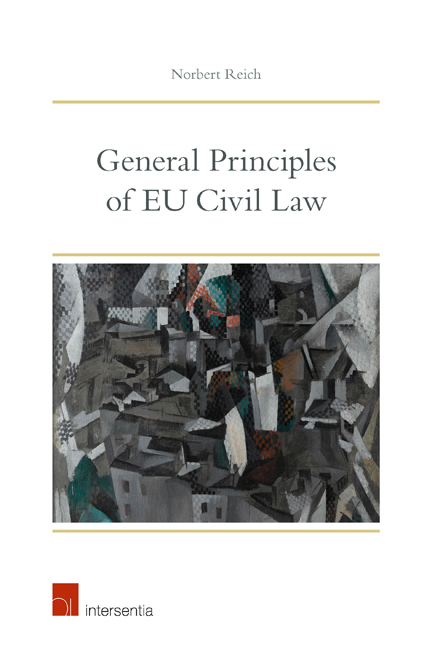Book contents
- Frontmatter
- Preface
- Contents
- Table of ECJ cases: alphabetical
- Table of ECJ cases: chronological
- Table of EU legislation
- List of abbreviations
- Introduction. What are General Principles of EU Civil Law?
- Chapter 1 The Principle of “Framed” Autonomy
- Chapter 2 The Principle of Protection of the Weaker Party
- Chapter 3 The Principle of Non-Discrimination
- Chapter 4 The Principle of Effectiveness
- Chapter 5 The Principle of Balancing
- Chapter 6 The Principle of Proportionality
- Chapter 7 An Emerging Principle of Good Faith and of a Prohibition of Abuse of Rights?
- Summary. Seven Theses and a Conclusion
- Index
Chapter 5 - The Principle of Balancing
Published online by Cambridge University Press: 22 November 2017
- Frontmatter
- Preface
- Contents
- Table of ECJ cases: alphabetical
- Table of ECJ cases: chronological
- Table of EU legislation
- List of abbreviations
- Introduction. What are General Principles of EU Civil Law?
- Chapter 1 The Principle of “Framed” Autonomy
- Chapter 2 The Principle of Protection of the Weaker Party
- Chapter 3 The Principle of Non-Discrimination
- Chapter 4 The Principle of Effectiveness
- Chapter 5 The Principle of Balancing
- Chapter 6 The Principle of Proportionality
- Chapter 7 An Emerging Principle of Good Faith and of a Prohibition of Abuse of Rights?
- Summary. Seven Theses and a Conclusion
- Index
Summary
INTRODUCTION: A DIALOGUE ON BALANCING IN EU CIVIL LAW
This chapter takes up some ideas that are well known in EU constitutional law, namely the need to balance seemingly contradictory positions that each claim protection of their interests in one of the many “rights” or “principles” of the Charter. Take as starting point the ECJ's Promusicae case (1.8) which concerned the balancing of the right to protection of intellectual property under Articles 17 and 47 of the Charter on the one hand with the right to privacy and personality protection under Articles 7 and 8 on the other. The Court wrote:
“The present reference for a preliminary ruling thus raises the question of the need to reconcile the requirements of the protection of different fundamental rights, namely the right to respect for private life on the one hand and the rights to protection of property and to an effective remedy on the other […] That being so, the Member States must, when transposing the directives mentioned above, take care to rely on an interpretation of the directives which allows a fair balance to be struck between the various fundamental rights protected by the Community legal order. Further, when implementing the measures transposing those directives, the authorities and courts of the Member States must not only interpret their national law in a manner consistent with those directives but also make sure that they do not rely on an interpretation of them which would be in conflict with those fundamental rights or with the other general principles of Community law, such as the principle of proportionality.”
A similar approach was taken in the more recent Sky case (1.13):
“In the light, first, of the importance of safeguarding the fundamental freedom to receive information and the freedom and pluralism of the media guaranteed by Article 11 of the Charter and, second, of the protection of the freedom to conduct a business as guaranteed by Article 16 of the Charter, the European Union legislature was entitled to adopt rules such as those laid down in Article 15 of Directive 2010/13, which limit the freedom to conduct a business, and to give priority, in the necessary balancing of the rights and interests at issue, to public access to information over contractual freedom.”
- Type
- Chapter
- Information
- General Principles of EU Civil Law , pp. 131 - 154Publisher: IntersentiaPrint publication year: 2013

